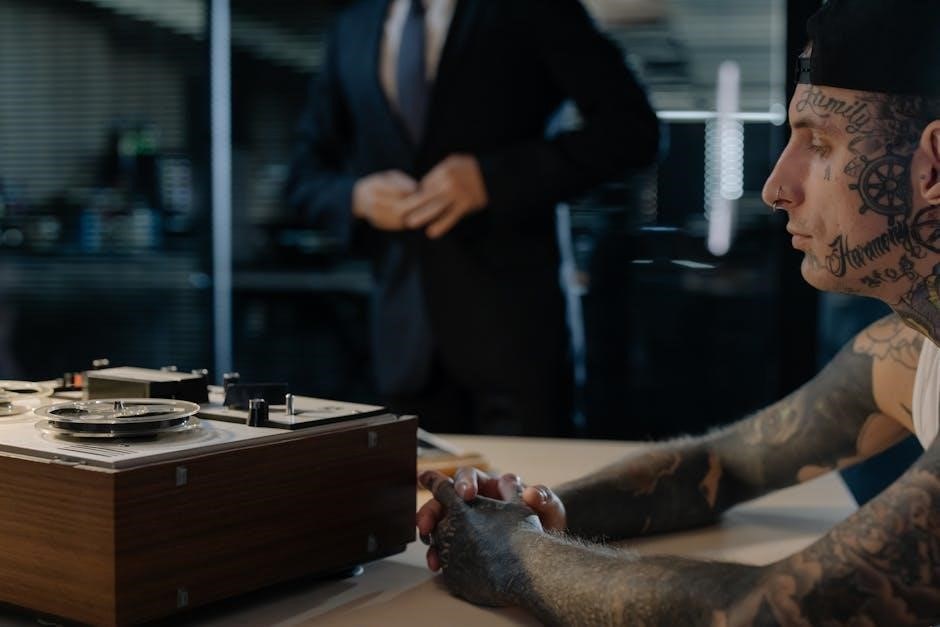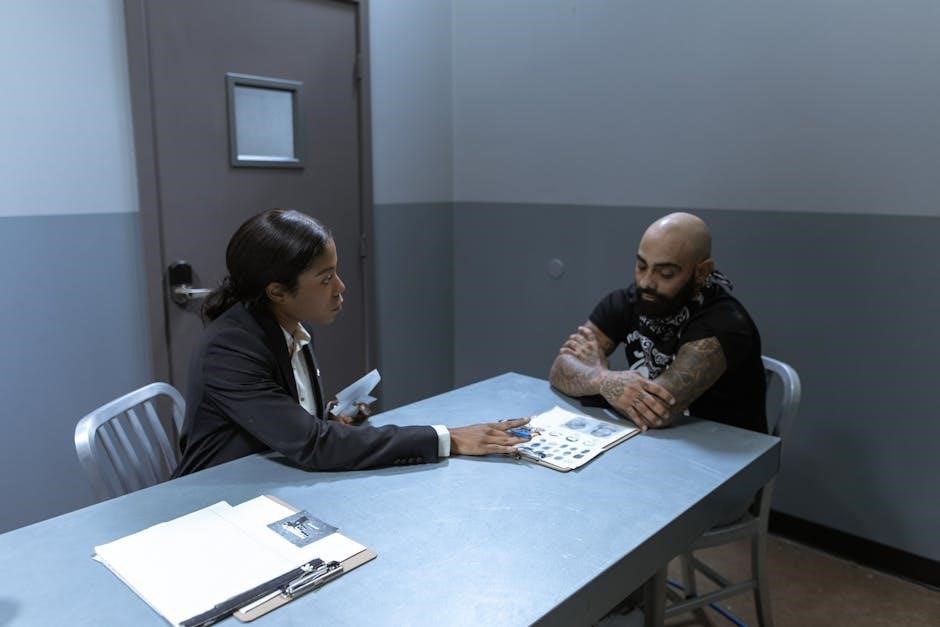Police Competency-Based Interview Questions and Answers: A Comprehensive Guide
Navigating the police recruitment process can be daunting, especially the competency-based interview. This guide provides valuable insights into preparing for these interviews, focusing on understanding common questions and structuring effective answers. Mastering the STAR method and practicing example questions will boost your confidence and performance, leading to success.
Competency-based interviews are a cornerstone of modern police recruitment, designed to assess your suitability for the role by evaluating specific skills and behaviors. Unlike traditional interviews that focus on theoretical knowledge, these interviews delve into your past experiences to predict future performance. Employers use targeted questions to uncover how you’ve handled situations, revealing crucial competencies.
This approach, also known as structural or behavioral interviewing, aims to determine if you possess the qualities necessary for effective policing. The focus is on evidence-based assessment, where your answers provide concrete examples of your skills in action. By understanding the principles behind competency-based interviews, candidates can better prepare to showcase their abilities.
The aim is to identify how you will behave based on how you behaved in the past. Therefore, understanding the core competencies required for the role is essential. During your interview, its common for the interviewer to ask scenario questions to determine how you may react in various circumstances.
The Importance of Competency and Values in Police Recruitment
Competency and values form the bedrock of effective policing, guiding officers’ actions and decisions in complex situations. Police recruitment processes heavily emphasize these attributes to ensure that only individuals who demonstrate the necessary skills and ethical standards are selected. Competency frameworks outline the specific behaviors and abilities required for success in various police roles.
Values such as integrity, fairness, and respect are paramount in maintaining public trust and upholding the law. The police competency and values framework ensures candidates possess a commitment to ethical conduct. Competency-based interviews assess whether candidates embody the values that align with the police service’s mission. These qualities include resilience, empathy, and a dedication to public service. Recruiters seek individuals who can navigate challenging situations with professionalism.
Ultimately, the integration of competency and values in police recruitment ensures that officers are not only skilled but also possess the moral compass necessary to serve their communities effectively. A strong alignment between personal values and organizational values results in better decision-making.
Common Police Competency Framework

The Police Competency Framework serves as a structured guide outlining the key skills, behaviors, and attributes expected of police officers. This framework provides a consistent benchmark for evaluating candidates during recruitment and assessing performance throughout their careers. It ensures that officers possess the necessary capabilities to effectively serve their communities and uphold the law.
Common competencies within the framework include areas such as decision-making, problem-solving, communication, and leadership. Decision-making involves the ability to assess situations, analyze information, and make sound judgments under pressure. Problem-solving focuses on identifying issues, developing effective strategies, and implementing solutions. Communication encompasses both verbal and written skills, enabling officers to interact effectively with diverse individuals and groups.
Furthermore, the framework often emphasizes personal qualities like integrity, resilience, and empathy. Integrity ensures officers act ethically and honestly, while resilience enables them to cope with the demands of the job. Empathy allows officers to understand and respond to the needs of the community. These competencies work together to ensure officers are well-rounded.
The STAR Method: Structuring Your Answers
The STAR method is a powerful technique for structuring your answers to competency-based interview questions. It provides a clear and concise framework that ensures you cover all the essential elements of a compelling response. STAR stands for Situation, Task, Action, and Result, each representing a key component of your answer.
Begin by describing the Situation. Set the scene by providing context for your example. Explain where and when the event took place. Next, outline the Task. Clearly state what your objective was in that particular situation. What were you trying to achieve? Then, detail the Action you took. Be specific about your role and what you did; Highlight the steps you took, and explain why you chose that approach.
Finally, describe the Result. Explain the outcome of your actions. What impact did your efforts have? Quantify your results whenever possible. Using the STAR method helps you present a structured answer. Therefore, you will provide a story and give all the required information to the interviewer, showcasing your competencies effectively.
Example Competency-Based Interview Questions and Answers
Preparing for a competency-based interview involves more than just understanding the theory; it requires practicing with realistic questions. This section offers example questions commonly asked in police interviews, along with sample answers demonstrating the STAR method in action. These examples are designed to illustrate how to structure your responses effectively and showcase your skills and experiences.
Let’s consider a question about problem-solving: “Describe a time when you had to think on your feet to solve a problem.” A strong answer would detail the specific situation, the task at hand, the actions you took to address the issue, and the positive results that followed.
Another common question focuses on teamwork: “Tell me about a time when you had to work collaboratively with a team to achieve a goal.” Your response should highlight your role within the team, the challenges you faced, and how you contributed to the team’s success. Reviewing these examples will equip you with a solid foundation for crafting your own compelling answers.
Integrity-Related Questions and Answers
Integrity is paramount in law enforcement. Interviewers will assess your moral compass through specific questions designed to reveal your ethical standards and decision-making processes. Expect questions like, “Describe a situation where you faced an ethical dilemma” or “Tell me about a time you witnessed misconduct and how you responded.” Your answers should demonstrate a commitment to honesty, accountability, and upholding the law, even under pressure.
When answering integrity-based questions, be prepared to discuss situations where you had to make difficult choices. Clearly articulate your reasoning, emphasizing your adherence to ethical principles and professional standards. For instance, if asked about witnessing misconduct, explain how you reported the incident through the proper channels, highlighting your dedication to maintaining integrity within the force.
Remember, honesty is crucial. Avoid embellishing or fabricating stories. Instead, focus on genuine experiences that showcase your unwavering commitment to ethical conduct. Demonstrating a strong moral compass will significantly enhance your candidacy.
Resilience-Related Questions and Answers

Policing demands immense resilience. Interviewers assess your ability to cope with stress, bounce back from setbacks, and maintain composure under pressure. Expect questions like, “Describe a time you faced a significant challenge and how you overcame it,” or “How do you handle stressful situations?” Your answers should highlight your coping mechanisms, problem-solving skills, and ability to learn from adversity.
When answering resilience-based questions, focus on specific examples where you demonstrated perseverance. Explain the situation, the obstacles you faced, the actions you took to overcome them, and the positive results you achieved. Showcase your ability to remain calm, focused, and productive even when dealing with difficult or emotionally charged situations.

Highlight strategies you use to manage stress, such as exercise, mindfulness, or seeking support from colleagues or mentors. Demonstrating self-awareness and a proactive approach to maintaining your well-being will assure the interviewer that you can handle the demands of the job.
Teamwork-Related Questions and Answers
Teamwork is crucial in policing. Expect questions exploring your ability to collaborate effectively, support colleagues, and contribute to a shared goal. Interviewers might ask, “Describe a time you worked effectively as part of a team,” or “How do you handle disagreements within a team?” Focus on your role, contributions, and how you fostered a positive team environment.
When answering, use specific examples demonstrating your teamwork skills. Describe the situation, your specific role, and how you collaborated with others to achieve a common objective. Highlight your ability to communicate effectively, listen to different perspectives, and compromise when necessary. Emphasize your commitment to supporting your colleagues and contributing to a positive team dynamic.
Showcase your ability to resolve conflicts constructively and maintain positive relationships with team members, even under pressure. Demonstrating your understanding of teamwork principles and your commitment to collaborative success will assure the interviewer that you can thrive in a team-oriented policing environment.
Problem-Solving-Related Questions and Answers

Police work frequently involves analyzing complex situations and finding effective solutions. Expect questions assessing your problem-solving skills, critical thinking abilities, and decision-making process. Common questions include, “Describe a time you faced a challenging problem and how you solved it,” or “How do you approach making decisions under pressure?” Frame your answers using the STAR method, emphasizing your analytical and problem-solving approach;
When responding, illustrate your ability to identify the core issues, gather relevant information, and develop creative solutions. Explain your decision-making process, highlighting any risks considered and the rationale behind your chosen course of action. Emphasize your capacity to evaluate outcomes and learn from experiences. Demonstrate your ability to think critically, remain calm under pressure, and adapt your approach when necessary.
Showcase your resourcefulness and your commitment to finding effective solutions, even in ambiguous or challenging circumstances. Conveying your problem-solving abilities and analytical mindset will assure the interviewer that you can handle the complexities of police work effectively and responsibly.
Communication Skills-Related Questions and Answers
Effective communication is paramount in policing, encompassing active listening, clear articulation, and persuasive interaction. Interviewers assess these skills through questions like, “Describe a time you effectively communicated a complex message,” or “How do you handle communication with someone who is angry or upset?” Employ the STAR method to showcase your abilities, emphasizing clarity, empathy, and adaptability.
When answering, highlight instances where you tailored your communication style to suit the audience and situation. Showcase your ability to actively listen, understand different perspectives, and respond appropriately. Illustrate your proficiency in de-escalating tense situations, resolving conflicts, and building rapport with individuals from diverse backgrounds. Emphasize your skills in written communication, demonstrating your ability to prepare clear and concise reports.
Demonstrate your commitment to maintaining respectful and professional communication at all times. Convey your understanding of the importance of non-verbal cues and your ability to adapt your communication style accordingly. Emphasize your capacity to convey information accurately and empathetically, building trust and fostering positive relationships within the community.
Tips for Success in a Police Competency-Based Interview
Acing a police competency-based interview requires meticulous preparation and a confident demeanor. Research the police department’s values and mission to align your answers accordingly. Practice the STAR method extensively, preparing compelling examples that showcase your skills and experiences. Focus on demonstrating key competencies such as integrity, resilience, teamwork, problem-solving, and communication.
During the interview, maintain eye contact, speak clearly, and listen attentively to each question. Take a moment to gather your thoughts before responding, ensuring your answers are structured and concise. Be honest and authentic, showcasing your personality and genuine interest in the role. Highlight your commitment to serving the community and upholding the law.
Prepare insightful questions to ask the interviewers, demonstrating your engagement and interest in the position. Dress professionally and arrive on time, conveying your respect for the process. After the interview, send a thank-you note, reiterating your enthusiasm for the opportunity. By following these tips, you can significantly increase your chances of success.
Preparing for Scenario-Based Questions
Scenario-based questions are a crucial part of police competency-based interviews, designed to assess your decision-making, problem-solving abilities, and ethical judgment under pressure. To prepare effectively, familiarize yourself with common policing scenarios, such as handling domestic disputes, responding to public disturbances, or dealing with suspects.
Practice analyzing these scenarios, considering the potential risks, legal implications, and community impact. Develop a structured approach to your responses, outlining the steps you would take, the resources you would utilize, and the principles guiding your actions. Emphasize your ability to remain calm, assess the situation objectively, and prioritize safety.
Consider various ethical dilemmas and how you would navigate them, demonstrating your commitment to integrity and fairness. Research relevant police procedures and protocols to ensure your responses align with best practices. Seek feedback from experienced officers or mentors to refine your approach and identify areas for improvement. By thoroughly preparing for scenario-based questions, you can showcase your potential to excel as a police officer;
